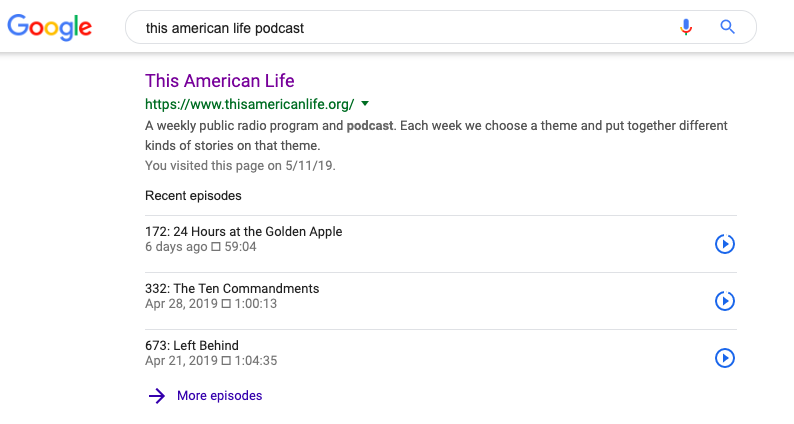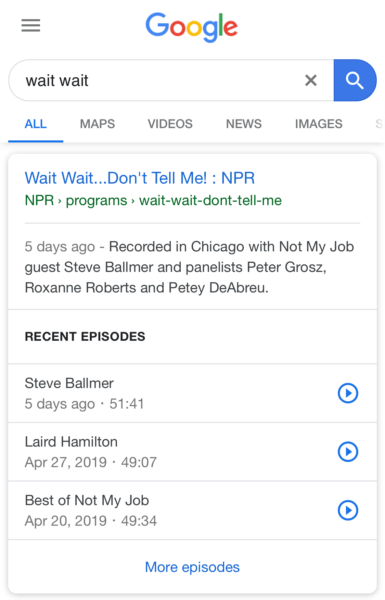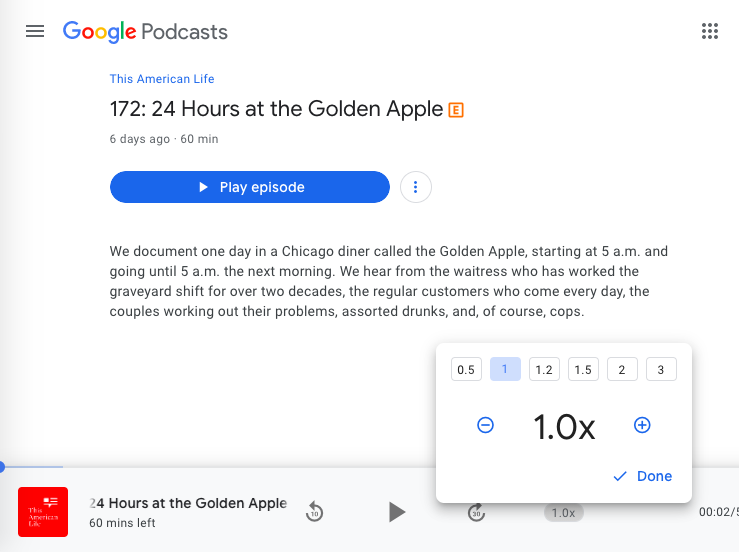Google Added Playable Podcasts to Search Results: Should Marketers Care?
Surprise, surprise: Google developed yet another feature to keep us loyal to our favorite virtual assistant—a paradox if there ever was one.
Last week at I/O 2019, Google announced that it will begin including podcasts in search results. Zack Reneau-Wedeen, founder and head of product for Google Podcasts, called the move, “a step toward making audio a first-class citizen across Google.”
The new functionality, now live across both mobile and desktop searches, allows users to listen to search for podcasts directly from the search results page or bookmark episodes to listen later.
Searching for a podcast through Google now populates a card that includes a description, the titles, dates, and lengths of the three most recent episodes, and “play” buttons that enable native listening.

Google search results with playable podcasts (desktop view)

Google search results with playable podcasts (mobile view)
The “play” feature includes all of your standard controls: play/pause, rewind 10 seconds/forward 30 seconds, and playback speeds ranging from 0.5x up to 3x.
Tapping a specific podcast episode link takes visitors to an expanded version on podcasts.google.com while the “More episodes” link leads to a list of the ten most recent episodes.

How to Enable Your Podcast to Sync With Google
If you want that neat and tidy card to pop up when someone searches for your podcast, you’ll need to do a bit of work on the back end. Google Developers created a comprehensive guide for enabling your podcast to appear in Google search results and Google Podcasts, but I included this quick and dirty rundown of the eligibility guidelines:
- Expose a valid RSS feed describing your podcast. This RSS feed must conform to Google’s RSS 2.0 specifications as well as its feed requirements.
- Your RSS feed must contain at least one episode that conforms to Google’s requirements.
- Your podcast must have a dedicated homepage and a link pointing to your RSS feed.
- The homepage, the RSS feed, and any non-blocked audio files must be exposed to Googlebot, meaning they can’t require a login and can’t be protected by robots.txt or <noindex> tags.
Google notes that it can take a few days for changes to be reflected in search results or the Google Podcasts app.
A Big Opportunity, or a Big Nothing-Burger?
As Google’s Reneau-Wedeen noted, this move is an important step toward giving podcasts their long-deserved time in Google’s digital spotlight. Given the fact that it’s been less than a week since the rollout, it may be too early to tell if producers and listeners should take that statement is gospel or dismiss it as a bunch of hot air. However, all early signs indicate that the new functionality will indeed give podcast producers new opportunities to finally get more eyes (ears?) to their shows.
Arguably the biggest win for producers is Google’s search depth capacity. Just as Google crawls the entirety of an article or a website for keywords, Google’s podcast search functionality analyzes the entire duration of shows, not just titles and meta descriptions. How? Google transcribes each show directly.
Another opportunity lies in the fact that Google’s native podcast functionality eliminates the need for standalone podcast apps, which once acted as a barrier between users and the rest of their content on the web such as videos, blog posts, and images. Whereas podcasts were once the red headed stepchild of the content family, Google’s seamless integration has now leveled the playing field in terms of discovery and functionality.
Before You Chug the Podcast SEO Kool-Aid…
As I type this, there are certainly swarms of SEO experts/gurus/influencers/ninjas furiously cranking out articles that will profess their secret insights to “hack” Google’s new podcast search functionality in order to turn you into the next “This American Life.”
The headlines will (unfortunately) look something like this…
5 Easy, Effective SEO Hacks to Skyrocket Your Podcast
103 Keywords Your Podcast MUST Have to Rank Higher
We Analyzed 9,000 Podcast Keywords: What You NEED to Know
Excuse me while I step into the bathroom to gag.
We’ve said it before and we’ll say it again: Marketing isn’t about those who arrive. It’s about those who stay.
I’m not going to sit here and tell you that SEO is irrelevant: nobody is saying you should hide your podcast. But instead of obsessing over generating leads, producers should obsess over building a show that’s worth leading people towards.
The blogging industry has already seen enough of this problem. Rather than focusing on writing thoughtful content with the intent of building a sustainable audience, many bloggers have sold their digital souls in exchange for backlinks and other vanity metrics. We might see more marketers dance dangerously close to a similar third rail of podcasting, especially when it comes to two parts of their shows: episode titles and opens.
For instance, Radiolab, Reply All, and other “premium” podcasts have popularized the pithy, intriguing episode title style over the years. Radiolab recently published “Bit Flip,” while Reply All ran the episode “What It Looks Like” last week. These are nods to key soundbites or themes from inside the episodes, but they aren’t overly descriptive of what you can expect once you hit play. In other words, this style of episode titling creates demand, driving listeners to solve this mini-mystery by hitting play, but they don’t capture demand. However, capturing demand is what search results like Google’s are for. Perhaps more marketers will now create lengthier, more descriptive episode titles to flag that whatever a Google user just searched for is exactly what they can expect in a given episode.
Additionally, we might see a change in how marketers choose to open their episodes. On YouTube, many creators who emphasize discoverability and YouTube SEO often begin their videos with sentences full of the keywords in their titles. Back on Google search, because the search giant will now be indexing podcasts by transcribing the audio and scanning them for keywords, more marketing showrunners might decide that the best way to open an episode is to mimic their YouTube counterparts, front-loading episodes with descriptive keywords. Unfortunately, these render each and every listener experience eerily similar across a competitive set of shows, while removing the ability to intrigue the audience and create questions in their minds — crucial things to achieve, given the “blind” nature of podcasting. The Golden Rule of Audio is, after all, “get them to the end.” The best possible episode openings encourage the listener to continuing listenership. They aren’t summaries or TL;DR cheat-sheets. That’s what blogging is for: grabbing attention and injecting learning quickly. Podcasts are built to hold attention over time, and it’s that time investment that makes them worthwhile for a brand. Optimizing for search might remove that benefit.
So yes, Google will crawl your podcast for keywords—but don’t get it twisted: your audience should always be, well, an audience, not a search engine.

Dominic Vaiana is a content marketer, ghostwriter, and bibliophile based in St. Louis. Connect with him at dominicv.net.

